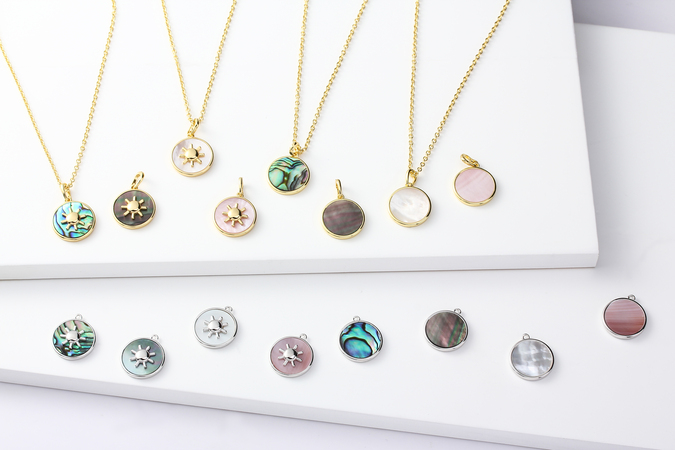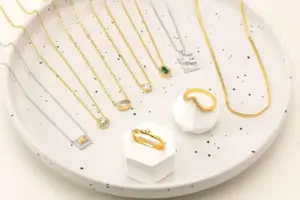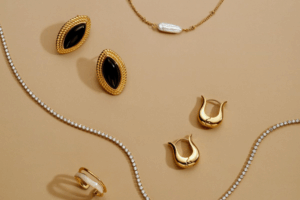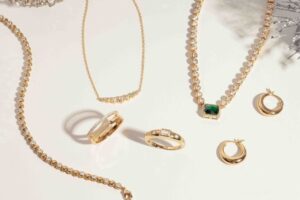Nickel is a common metal that causes skin reactions to most people, especially those with sensitive skin. Hence, many people always advocate for nickel free jewelry whether it’s body piercings, earrings, bracelets, etc. This helps to prevent potential health issues and allows jewelry lovers to enjoy their accessories without worrying about skin reactions.
Source: Pinterest
In this blog, we will discuss nickel free meaning and some key facts about nickel free jewelry that will help you make an informed decision about buying the right jewelry for your skin.
Understanding Nickel and Nickel Allergy
Nickel is a slivery-white metal that’s commonly used in jewelry. It’s the most common allergenic metal, but it’s usually used because of its strength, durability, resistance to corrosion, and for increasing the brightness of jewelry.
Nickel allergy is one of the most common causes of contact dermatitis. When nickel ions penetrate into the skin pores, it causes allergies and inflammation, with symptoms like redness, rashes, itching, blisters, dry skin, etc.
What Is Nickel Free Jewelry?
What does nickel free mean in jewelry? Nickel-free jewelry refers to jewelry pieces that don’t contain nickel on a literal level. Jewelry manufacturers try to use hypoallergenic metals that contain as little nickel as possible, like sterling silver, gold, titanium, platinum, and surgical-grade stainless steel, to make sure the goods are safe for their clients.
Does Nickel Free Really Mean 0 Nickel?
No, nickel-free does not mean jewelry is completely without nickel. Rather, it means that the jewelry complies with authoritative standards for nickel release set to regulate human safety and nickel content. As long as the nickel is within the nickel release standards, it will NOT damage your health.
Nickel Content ≠ Nickel Release ≠ Unsafe to Wearer
Is jewelry containing nickel necessarily harmful to wearers? No, just because a piece of jewelry contains nickel doesn’t mean it’s unsafe to wear. What truly matters is the nickel release rate, not just the presence of nickel in the material.
According to the REACH regulation established by the European Union, the allowable nickel release limit is 0.5 μg/cm²/week for items in direct and prolonged contact with the skin. If the release stays below this threshold, even nickel-containing jewelry can be considered safe and hypoallergenic.
Source: Pinterest
Some of the authoritative standards for nickel control are:
US Standards for Nickel Release
California Proposition 65 is one of the authoritative regulations set to control nickel content for jewelry making in the USA. The regulatory nickel content is stipulated to be compounds of nickel with solubility in water of greater than 0.1 moles per liter (mol/L) at 20⁰C.
EU Standards for Nickel Release
- REACH
Registration, Evaluation, Authorization, and Restriction of Chemicals (REACH) is a regulatory organization in the European Union that controls the concentration of dangerous chemicals and heavy metals in consumer products.
Nickel has to be present on the skin as nickel ions in a solution. But as a control measure, REACH legislation sets limits for the migration of nickel as follows:
| Product Types | Products | Nickel Limitation(μg/cm²/week) |
| Post assemblies inserted into pierced ears and other pierced parts of the human body | Earrings, body piercing | 0.2 |
| Products intended to come into direct contact with the skin for long periods | Necklaces, bracelets, rings, etc | 0.5 |
- CEN EN 1811:2023
This is another European Union standard that outlines the reference test method for the release of nickel from post assemblies inserted into pierced parts of the human body and articles intended for direct or prolonged skin contact.
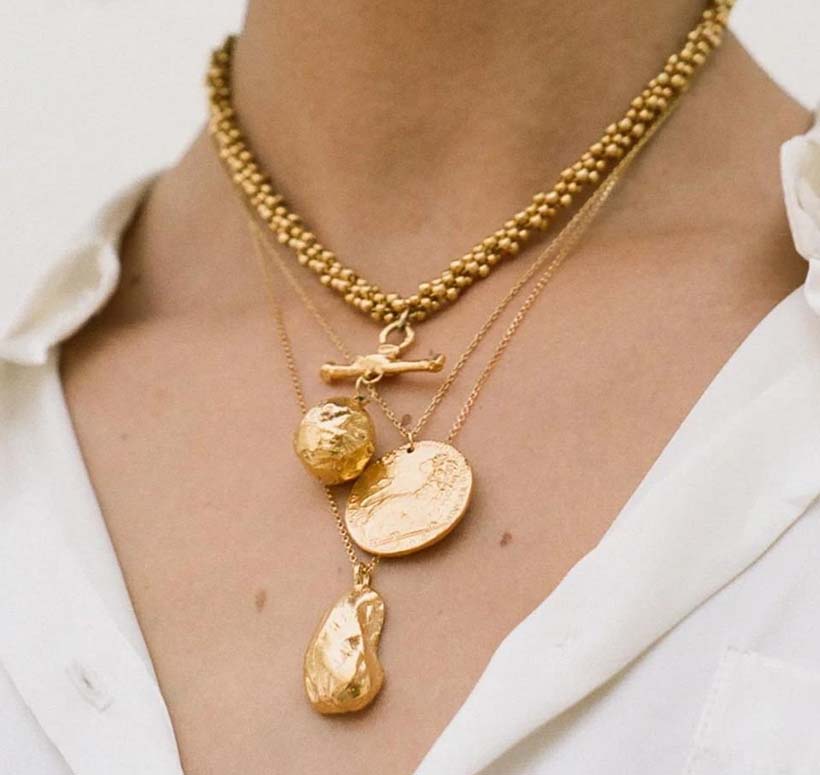
Is Nickel Free the Same as Hypoallergenic?
No, nickel-free is not the same as hypoallergenic. Nickel free means that the jewelry complies with authoritative standards for nickel release set to regulate human safety and nickel content.
Does hypoallergenic mean nickel free? No exactly, hypoallergenic, on the other hand, means jewelry that’s less likely to cause an allergy. It doesn’t mean it’s without nickel.
For example, there are hypoalergenic jewelry like higher karat of gold vermeil jewelry, gold filled jewelry and stainless steel jewelry, etc, which contain small amounts of nickel but the nickel is too low to cause skin reactions.
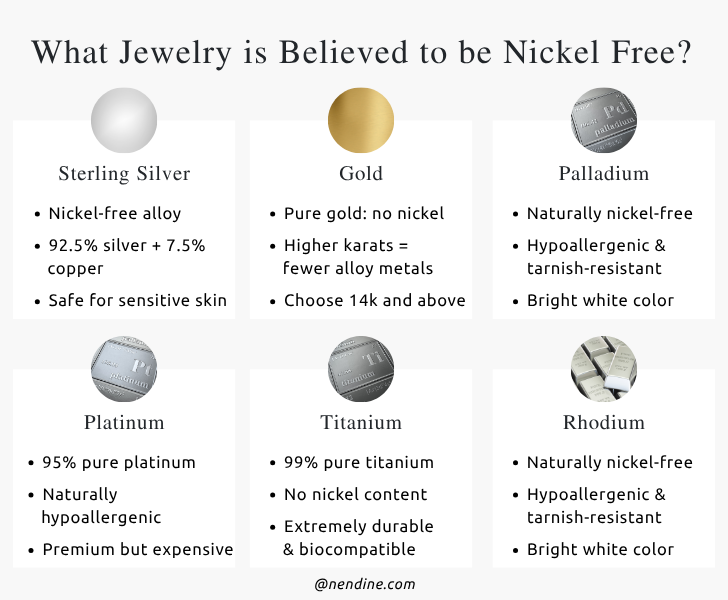
What Jewelry is Believed to be Nickel Free?
To identify nickel free jewelry, the best possible way is to consider premium metals that contain little to no nickel content. Below are some jewelry metals that can be considered nickel free:
- Sterling Silver
Does sterling silver contain nickel? No, genuine sterling silver does not contain nickel. Sterling silver jewelry is an alloy that’s made up of 92.5% pure silver and 7.5% copper, which is why it’s sometimes called .925 or 925 silver. Copper is used instead of nickel as additional strength for the naturally soft, pure silver. This has made sterling silver a popular choice for people who are looking for nickel free metal jewelry.
- Higher Karat of Gold
Is gold nickel free? Gold in its pure form doesn’t contain nickel and it’s very hypoallergenic. However, it’s too soft for most types of jewelry, hence why it’s often alloyed with other metals.
Higher karat gold jewelry contains a greater percentage of pure gold and a lower amount of alloyed metals. Lower gold karat jewelry often contains a larger proportion of other metals that are more likely to cause allergy. Thus, it’s recommended to choose gold jewelry with gold purity from 14K to 24K.
- Palladium
This is a nickel free metal that’s highly resistant to tarnishing and corrosion. Palladium is a member of the platinum group of metals, which is used to make lead and nickel free jewelry. Generally, palladium is often added to jewelry to give it a bright, white, and strong appearance without the need for nickel.
- Platinum
This is a dense, durable, and naturally hypoallergenic metal. Platinum jewelry is made up of 95% pure platinum and 5% of other metals. This ensures that the jewelry remains safe without any metal nickel allergy. However, it can be very costly.
- Titanium
Titanium is 99% pure and does not contain nickel. It’s very popular for its lightweight, durability, biocompatibility, and hypoallergenic properties. Aside from jewelry, it’s also used in medical implants and surgical instruments because of its inert properties. Generally, titanium is a great option for metals that will be in contact with the body for a prolonged time.
- Rhodium
Rhodium is also part of the platinum group of metals. It’s a rare, precious metal used to coat other metals to give them a brilliant, reflective appearance. Rhodium is hypoallergenic and can be used to cover metals that contain nickel. This prevents direct contact with any potential allergens in the underlying metals.
Is Stainless Steel Jewelry Nickel Free?
Stainless steel jewelry isn’t fully nickel-free, but the nickel content is very low. As long as its nickel release meets safety standards, it’s considered safe to wear and does not cause harm or trigger reactions for most people.
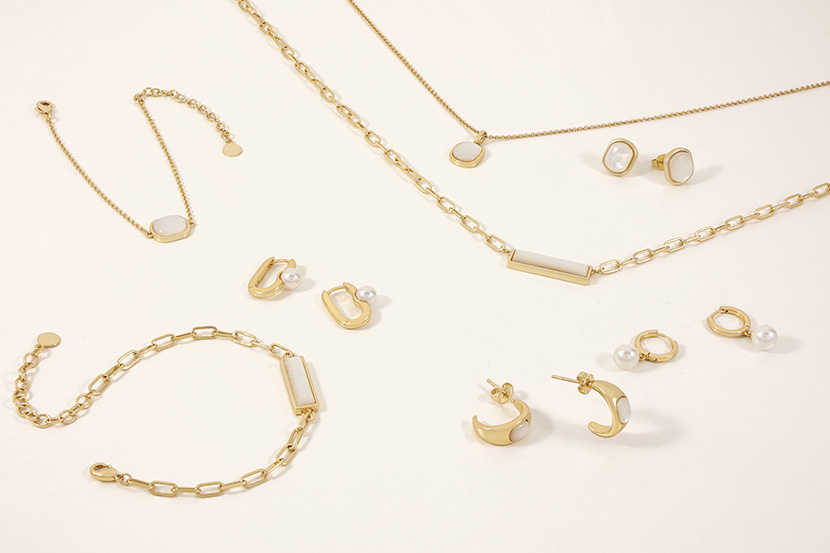
How to Choose Nickel-Free Metal for Different Budgets?
For small brands that care about offering nickel-free jewelry, this is a breakdown of metals you can choose based on your budget.
| Sterling Silver | Gold | Palladium | Platinum | Rhodium | |
| Nickel-free by definition | Yes | Yes | Yes | Yes | Yes |
| Composition | 92.5% Silver, 7.5% Other Metals (usually Copper) | 14k: 58.3% gold18k: 75% gold24k: 100% gold | Pure Palladium or alloyed with other metals | 95% Platinum, 5% Other Metals | Pure rhodium or used as a plating over other metals |
| Hypoallergenic | Hypoallergenic | Hypoallergenic | Highly hypoallergenic | Highly hypoallergenic | Highly hypoallergenic |
| Durability | Moderate | High | High | Very High | Very High |
| Color | Bright, white with a slight grayish tint | Yellow, rose, or white, depending on the alloy | White | White | Brilliant white |
| Cost | Moderate | High | High | Very high | Very high |
Is Nickel-Free Jewelry Waterproof?
Nickel free jewelry can be waterproof under certain conditions. Whether a jewelry is waterproof depends on the material used in its making, as well as the thickness and quality of the plating.
For example, silver jewelry is not waterproof in itself. But we use several techniques to achieve waterproof jewelry, such as applying rhodium plating over the silver metal. Also, a layer of palladium during electroplating is added and even e-coating is done to make the silver jewelry highly resistant to water and prolong the color retention time.
Does Nickel Free Jewelry Tarnish?
Yes, lead and nickel-free jewelry can tarnish, but it depends on the base metal and coating used. To minimize tarnishing, choose jewelry made from high-quality nickel-free materials such as stainless steel, silver, higher karats of gold vermeil, gold filled and solid gold and store it properly away from moisture and chemicals. For more tips on keeping your pieces looking new, check out our guide on types of anti-tarnish jewelry.
Does Nickel-Free Jewelry Turn Green?
This largely depends on the metal used in making the jewelry. Some metals may react with skin acids, sweat, or lotions, thereby causing discoloration. But high-quality nickel free jewelry will not turn green easily. It maintains its color and finish, especially when cared for and maintained properly.
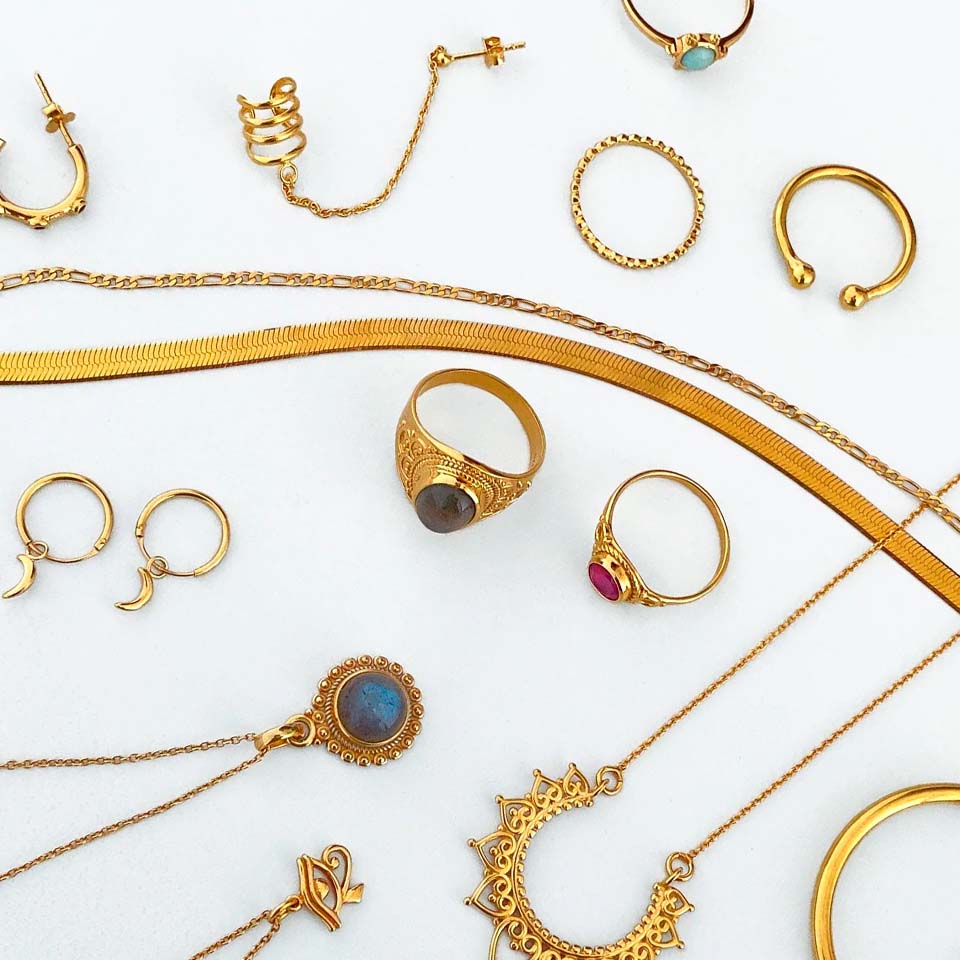
Which Types of Brands Should Be Particularly Attentive to Nickel-Free Jewelry
When it comes to jewelry for nickel allergy, these brands should have jewelry certifications and particularly follow the nickel release regulations to ensure customers’ safety and comfort.
- Body Piercing Shops
Body piercing products come into direct contact with sensitive areas of the skin for long periods. Jewelry used for body piercings should be made from hypoallergenic and nickel-free metals like 316L stainless steel to reduce the risk of infections or allergic reactions.
- Earrings Stores
Earrings and cartilage are common parts of the ear that face allergic reactions because of prolonged contact with jewelry. Therefore, stores specializing in earrings and ear studs must provide nickel-free products to avoid causing discomfort or rashes.
- Permanent Jewelry
Permanent jewelry like welded bracelets or anklets should be nickel-free and hypoallergenic since they will be worn 24 hours a day. Reliable metals like rhodium plating silver, gold, platinum, or titanium should be used to prevent allergic reactions.
- Children Jewelry
Children’s skin is more sensitive and prone to irritation. Therefore, brands catering to children’s jewelry must use nickel-free and hypoallergenic metals to prevent children from developing contact dermatitis.
- Maternity Jewelry
During pregnancy, women have hormonal changes, which make the skin more sensitive, potentially increasing the risk of allergic reactions. Thus, maternity jewelry often worn throughout pregnancy should be nickel free to accommodate the heightened sensitivity and reduce discomfort.
Key Takeaway
Nickel is a common metal used in jewelry making, but poses a lot of threat, especially for people with sensitive skin. Choosing nickel free jewelry like pieces made from stainless steel, sterling silver, higher karat of gold, palladium, and platinum is essential to prevent nickel allergies.
Do you need nickel free and hypoallergenic jewelry that suits people with sensitive skin? Contact us today for the best options.
FAQs
Yes, 14K gold contains nickel, but the amount varies by each manufacturer’s alloy formula. As long as its nickel release meets safety standards, it’s generally safe for everyday wear.
Yes, nickel-free brass without proper coating still tarnishes. Its copper content naturally reacts with air over time, causing darkening, which can be cleaned or polished easily. However, with proper handling, brass jewelry can also be tarnish-resistant.
It depends. Some gold-plated jewelry isn’t nickel-free because nickel is often used beneath the gold. Choose reputable manufacturers that ensure nickel release stays within safe standards.
